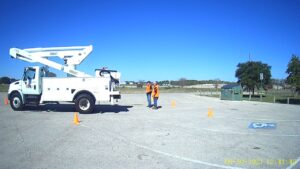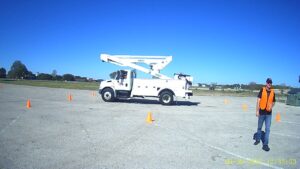Class B CDL FMCSA Entry-Level Driver Training
Individuals who acquire a commercial learner’s permit (CLP) on or after February 7, 2022, are required to successfully complete this course prior to being eligible for their CDL skills test. The course results will be submitted to the FMCSA Training Provider Registry upon completion. CDL Testing centers will retrieve these results from the registry to verify that the student has fulfilled this requirement before administering any testing services.
The course includes 30 units that align with the CDL Class B ELDT standards set by the FMCSA:
Entry-Level Driver Training (ELDT)
Driver Theory
Module One
- Introduction
- Operating Systems/Dashboards
- Pre-Trip / Post-Trip Inspection
- Basic Controls
- Shifting/Transmission Controls
- Backing

Two
- Visual Observation
- Communication
- Distracted Driving
- Speed Management
- Space Management
- Night Operation
- Adverse Driving Conditions
Three
- Hazard Perception
- Skid Recovery
- Railroad Crossings
Four
- Identify and Diagnose Malfunctions
- Roadside Inspections
- Maintenance Pre-Trip Inspection
Five
- Handling and Documenting Cargo
- Environmental Compliance
- Hours of Service
- Fatigue and Wellness Awareness
- Post-Crash Procedures
- External Communication

- Whistleblower/Coercion
- Trip Planning
- Drugs/Alcohol
- Medical Requirements
Start Now

If you’re looking to embark on a career in commercial trucking, obtaining a Class B CDL is a crucial step towards achieving your goals. And when it comes to training for a Class B CDL, the ELDT program is a game-changer. With its comprehensive curriculum and hands-on approach, ELDT Class B CDL training sets you up for success in the trucking industry. Designed specifically for aspiring commercial truck drivers, ELDT training covers all the essential aspects of safe and efficient truck operation. From mastering vehicle control and maneuvering to understanding federal regulations and industry best practices, this program equips you with the knowledge and skills needed to excel on the road. But the benefits of ELDT Class B CDL training go beyond just acquiring the necessary qualifications. By completing this program, you’ll open doors to a world of opportunities in the booming commercial trucking industry. Whether you dream of delivering goods across the country or pursuing a career as a local truck driver, ELDT Class B CDL training is the first step towards turning your aspirations into reality. Don’t let this chance pass you by. Enroll in ELDT Class B CDL training today and take the first step towards launching your career in commercial trucking.
Requirements for Class B CDL training
Before you can enroll in an ELDT Class B CDL training program, you’ll need to meet certain requirements. These requirements vary by state, but typically include the following:
Age: You must be at least 18 years old to obtain a Class B CDL license for intrastate driving, and 21 years old for interstate driving.
Valid driver’s license: You must hold a valid driver’s license for the state where you plan to obtain your Class B CDL.
Medical certification: You’ll need to pass a Department of Transportation (DOT) physical examination and obtain a medical certificate.
Knowledge test: You must pass a written knowledge test covering topics such as vehicle inspection, safe driving techniques, and cargo handling.
Skills test: You’ll need to pass a skills test that includes a pre-trip inspection, basic vehicle control, and on-road driving.
Skills and knowledge gained through ELDT training
ELDT Class B CDL training equips you with the skills and knowledge needed to succeed in the commercial trucking industry. Here are some of the key areas you’ll focus on during your training:
Vehicle control and maneuvering: You’ll learn how to safely operate Class B vehicles, including backing up, turning, and parking in various situations.
Defensive driving techniques: ELDT training emphasizes the importance of defensive driving to prevent accidents and ensure the safety of yourself and others on the road.
Federal regulations and industry best practices: You’ll gain a deep understanding of the rules and regulations that govern the trucking industry, as well as the best practices for compliance.
Vehicle maintenance and inspection: ELDT training covers the basics of vehicle maintenance and inspection, ensuring that you can identify potential issues before they become major problems.
Hazardous materials handling: If you’re interested in transporting hazardous materials, ELDT training programs often offer specialized courses that teach you how to handle these materials safely and in compliance with regulations.
By developing these skills and acquiring this knowledge, you’ll be well-prepared to navigate the challenges of the trucking industry and excel in your career.
Job opportunities for Class B CDL holders
With a Class B CDL license in hand, you’ll have access to a wide range of job opportunities in the commercial trucking industry. Here are just a few of the career paths you can explore:
Local delivery driver: Many companies rely on Class B CDL holders to transport goods within a specific region. As a local delivery driver, you’ll typically have regular routes and be home every night.
Bus driver: If you enjoy working with people and have excellent customer service skills, becoming a bus driver may be the right choice for you. Class B CDL holders are often sought after for positions in public transportation and school bus driving.
Dump truck driver: Operating a dump truck requires specialized skills, and Class B CDL holders are in high demand for these positions. Dump truck drivers transport construction materials, gravel, and other materials to and from job sites.
Moving truck driver: Moving companies often require Class B CDL holders to drive their trucks and transport customers’ belongings. This can be a rewarding career choice for those who enjoy helping others during the moving process.
These are just a few examples of the many job opportunities available to Class B CDL holders
How to choose the right ELDT training program
When it comes to choosing an ELDT training program, there are several factors to consider. Here are some tips to help you make the right choice:
Accreditation: Ensure that the training program you choose is accredited by the appropriate governing bodies. This ensures that the program meets the necessary standards for quality education.
Curriculum: Review the curriculum of the training program to ensure that it covers all the essential topics, including vehicle control, federal regulations, and industry best practices.
Hands-on training: Look for a program that offers hands-on training opportunities, as this will provide you with the real-world experience needed to succeed in the industry.
Job placement assistance: Consider programs that offer job placement assistance upon completion. This can be invaluable in helping you secure employment after graduation.
Reputation: Research the reputation of the training program and read reviews from past students. This will give you an idea of the program’s quality and whether it is a good fit for you.
By considering these factors and conducting thorough research, you can choose an ELDT training program that will set you up for success in your commercial trucking career.
Success stories of individuals who launched their careers through ELDT training
ELDT Class B CDL training has helped countless individuals launch successful careers in the commercial trucking industry. Here are a few success stories to inspire you:
John Smith: After completing his ELDT training program, John secured a job as a local delivery driver for a major logistics company. Within a year, he was promoted to a supervisor role and now manages a team of drivers.
Sarah Johnson: Sarah always had a passion for driving, and after obtaining her Class B CDL license through ELDT training, she decided to become a bus driver. Today, she works for a local school district and enjoys the daily interaction with the students she transports.
Michael Thompson: Michael’s dream was to become a dump truck driver, and ELDT training helped him achieve that dream. He now works for a construction company and enjoys the variety of projects he gets to be a part of.
These success stories are just a glimpse of what can be achieved through ELDT Class B CDL training. With dedication, hard work, and the right training, you too can launch a rewarding career in commercial trucking.
